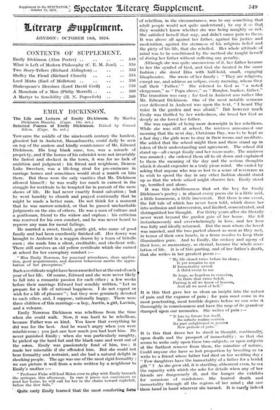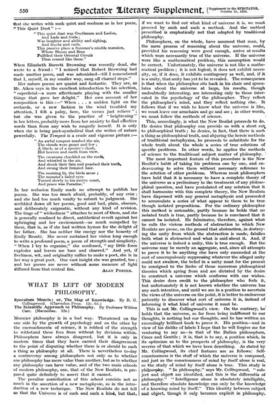EMILY DICKINSON.
The Life and Letters of Emily Dickinson. By Martha Dickinson Bianchi. (Cape. 18s. net.) Selected Poems of Emily Dickinson. Editod by Conrad Aiken. (Cape. 6s. net.) TOWARDS the middle of the nineteenth century the hardest, glossiest hat in Amherst, Massachusetts, could daily be seen on top of the austere and kindly countenance of Mr. Edward Dickinson. His long black cane, too, was a miracle of propriety, and if the horses of his cabriolet were not invariably the fastest and sleekest in the town, it was for no lack of ambition and judgment : his friend and neighbour, Deacon Luke Sweetser, was a life-long rival for pre-eminence in carriage horses and sometimes would steal a march on him there. But these were the only vanities that Mr. Dickinson allowed himself : he was really too much in earnest in the struggle for rectitude to be tempted far in pursuit of the mere shows of life. He had never exactly found salvation ; but he went humbly to church and prayed continually that he might be made a better man. Do not think for a moment that he was narrow-minded, or that he passed uncharitable judgments on the sins of others. He was a man of culture and a gentleman, friend to the widow and orphan : his criticism was reserved for his own conduct, and he was never heard to reprove any man for moral failings.
He married a sweet, timid, gentle girl, who came of good family and had been excellently finished off. Her dowry was brought to Amherst in a waggon drawn by a team of brindle oxen ; she made him a silent,, creditable, and obedient wife. There still survives an old yellow certificate which she earned at school for her exemplary conduct :— "Miss Emily Norcross, for punctual attendance, close applica- tion, good acquirements, and discreet behaviour merits the appro- bation of her preceptress."
Such a certificate might have been awarded her at the end of each year of her life. Of course, Edward and she were never likely to fall into a romantic passion for each other ; a few weeks before their marriage Edward had sensibly written, "Let us prepare for a life of rational happiness. I do not expect or wish for a life of pleasure" ; but they were genuinely devoted to each other, and, I suppose, rationally happy. There were three children of this marriage—a boy, Austin, a girl, Lavinia, and a volcano.
Emily Norcross Dickinson was rebellious from the time when she could walk. Now, it was hard to be rebellious, because Father was so kind. You knew that everything he did was for the best. And he wasn't angry when you were mischievous ; you just saw how much you had hurt him. He never punished Emily ; when she was particularly naughty, he picked up the hard hat and the black cane and went out of the roam. Emily was passionately fond of him, too ; it made her miserable if she offended him. But she could not bear formality and restraint, and she had a natural delight in shocking people. The age was one of the most rigid formality ; we can picture it well from a note written by a neighbour to Emily's mother :— .
"Professor Fiske will lead Helen over to play with Emily beneath the syringes, this afternoon. In case it prove not convenient to send her home, he will call for her in the chaise toward nightfall, before the dew falls."
-quite ealiy Emily learned that-the most comforting form of rebellion, in the circumstances, was to say something that adult people would not quite understand to say it so that they wouldn't know whether she was being naughty or not. She satisfied herself that way, and didn't cause pain to them. It was above all against her father, against his justice and moderation, against the sternness of his religious belief and the piety of his life, that she rebelled. Her whole attitude of mind was to be conditioned by the method she taught herself of daring her father without suffering any penalty.
Although she was quite unconscious of it, her father became to her the symbol of God, and God she treated in the same fashion ; she dared Him with half-bold, small, engaging
blasphemies. She wrote of her family : "They are religious, except me, and address an eclipse, every morning, whom they
call their ' Father.' " She referred to God as "a noted clergyman," as "Papa above," as "Burglar, banker, father." The transition was easy ; for God in Amherst was rather like Mr. Edward Dickinson. One of the most notable sermons ever delivered in Amherst was upon the text, "I heard Thy voice in the garden and was afraid." But however much
Emily was thrilled by her wickedness, she loved her God as deeply as she loved her father.
She was capable of being more downright in her rebellions. While she was still at school, the mistress announced one morning that the next day, Christmas Day, was to be kept as a fast day ; the girls were to stay in their rooms and meditate. She added that the school might then and there stand up in token of their understanding and agreement. The school did stand up—all except Emily and her room-mate. The mistress was amazed ; she ordered them all to sit down and explained to them the meaning of the day and the serious thoughts which it should engender in a truly pious mind. She ended by asking that anyone who was so lost to a sense of reverence as to wish to spend the day in any other fashion should stand up so that the whole school might observe her. Emily stood up, terrified and alone.
It was this rebelliousness that set the key for Emily Dickinson's poetry ; in almost every poem she is a little acid, a little humorous, a little irreverent. But there is one event, the full tale of which has never been told, which drove her into seclusion and introversion, and limited, concentrated, and distinguished her thought. For thirty years after she literally never went beyond the garden gate of her home. She fell instantaneously and overwhelmingly in love, and her love was fully and ideally returned. But the man whom she loved was married, and the two parted almost as soon as they met, in terror of their own hearts, in a fierce resolve to keep their illumination pure. And to Emily, the ecstasy and agony of their love, so momentary, so eternal, became the whole reve- lation of life. It is of this parting, and of her father's death, that she writes in her greatest poem :—
" My life closed twice before its close ; It yet remains to see If Immortality unveil A third event to me
So huge, so hopeless to conceive, As these that twice befell.
Parting is all we know of heaven, And all we need of hell."
It is this that gave her so clean an insight into the nature of pain and the expanse of pain ; for pain must come in its most penetrating, most terrible degrees before we can seize it thoroughly in consciousness and have the map of its grandeur stamped upon our memories. She writes of pain :— "It has no future but itself, Its infinite realms contain Its past enlightened to receive New periods of pain."
It is this that drove her to dwell in thought, continually, upon death and the prospect of immortality ; so that sho seems to write only upon these two subjects, or upon subjects at the furthest remove from them, the minutiae of nature.
Could anyone else have so lost proportion by brooding as to write to a friend whose father had died on her wedding day ; "Few daughters have the immortality of a father for a bridal gift " ? As she grew old, it is startling, abhorrent even, to sets the rapacity with which she asks for details when any of her Mends are dangerously ill, and the hunger she exhibits for occasions of condolence. She hunted death and immortality through all the regions of her mind ; she saw
them hand in hand wherever she turned. It is rarely indeed
that she writes with such quiet and coolness as in her poem, This Quiet Dust" :—
" This quiet duet was Gentlemen and Ladies,
And Lads and Girls ; Was laughter and ability and sighing, And frocks and curls.
This passive place a Summer's nimble mansion, Where Bloom and Bees Fulfilled their Oriental Circuit Then ceased like these."
When Elizabeth Barrett Browning was recently dead, she wrote to a friend : "I noticed that Robert Browning had made another poem, and was astonished—till I remembered that I, myself, in my smaller way, sang off charnel steps."
Her nature poems are quaint and fantastic. They are, as Mr. Aiken says in the excellent introduction to his selection, " superficial—a mere affectionate playing with the smaller things that gave her delight." Her own account of her composition is this :—" When . . . a sudden light on the orchards, or a new fashion in the wind troubled my attention, I felt a palsy, here, the verses just relieve " ;
but she was given to the practice of " heightening " in her letters, probably more from her anxiety to find effective words than from any wish to magnify herself. It is only when she is being part-symbolical that she writes of nature powerfully. The Tempest is a crude and vigorous picture :— "An awful tempest mashed the air, The clouds were gaunt and few ; A black, as of a spectre's cloak, Hid heaven and earth from view.
The creatures chuckled on the roofs,
And whistled in the air, And shook their fists and gnashed their teeth, And swung their frenzied hair.
The morning lit, the birds arose ; The monster's faded eyes
Turned slowly to his native coast, And peace was Paradise."
In her seclusion Emily made no attempt to publish her poems. She was too much afraid, probably, of any crise ; and she had too much vanity to submit to judgment. She
scribbled down all her poems, good and bad, plain, obscure, and deliberately enigmatic, without any kind of revision. The tinge of" wickedness" attaches to most of them, and she is generally confined to direct, antithetical revolt against her upbringing and her environment—as much compelled by them, that is, as if she had written hymns for the delight of her father. She has neither the energy nor the honesty of Emily Bront6. She never sustained her vision long enough to write a profound poem, a poem of strength and simplicity. "When I try to organize," she confessed, "my little force explodes and leaves me bare and charred." And yet, if liveliness, wit, and originality suffice to make a poet, she is in her way a great poet. One vast insight she was granted, too ; and her poems are never without some measure of light



























































 Previous page
Previous page